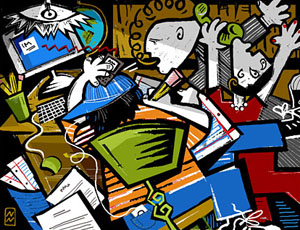 So you think you’re a great multitasker? Research by Stanford’s Eyal Ophir says you’re probably wrong:
So you think you’re a great multitasker? Research by Stanford’s Eyal Ophir says you’re probably wrong:
Test subjects were divided into two groups: those classified as heavy multitaskers based on their answers to questions about how they used technology, and those who were not.
In a test created by Mr. Ophir and his colleagues, subjects at a computer were briefly shown an image of red rectangles. Then they saw a similar image and were asked whether any of the rectangles had moved. It was a simple task until the addition of a twist: blue rectangles were added, and the subjects were told to ignore them.
The multitaskers then did a significantly worse job than the non-multitaskers at recognizing whether red rectangles had changed position. In other words, they had trouble filtering out the blue ones — the irrelevant information.
So, too, the multitaskers took longer than non-multitaskers to switch among tasks, like differentiating vowels from consonants and then odd from even numbers. The multitaskers were shown to be less efficient at juggling problems.
But all is not lost. According to researchers at the University of Utah, some people are “supertaskers” who really can juggle multiple information streams efficiently. How many? About 3% of the population. You might be one of them!
But probably not. So put down your iPad, close that Twitter feed, turn off your chat windows, and get to work.

















